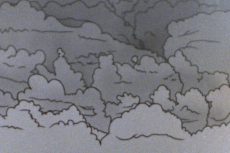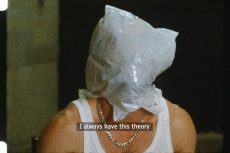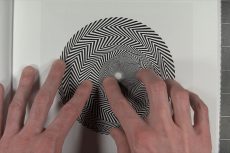“Jean-Paul Kelly: A Minimal Difference.” April 5, 2015
- A Minimal Difference
- The Innocents
- Movement in Squares
Jean-Paul Kelly: A Minimal Difference
In the last two years, Toronto visual artist Jean-Paul Kelly has created a suite of videos that have honed his long-standing investigations of documentary imagery and its claims to truth. Using abstraction, animation and re-enactments, Kelly isolates the formal core of photojournalism and verité documentary to analyze the mediums’ attractions and seductions—a practice that resonates with both visual arts discourse on the traumatic image and recent cinematic forays back into the roots of documentary form. This interdisciplinary nimbleness has drawn Kelly accolades from both the gallery and the cinema worlds, most recently the prestigious Kazuko Trust Award for “artistic excellence in the moving image” at the New York Film Festival last fall. This programme—which includes a brand new piece fresh from the artist’s residency at the Delfina Foundation in London—speaks to the densely self-interrogating constellation of ideas that constitute Kelly’s work, and suggests new ways of thinking through the logic of the documentary image.
The centrepiece of Kelly’s recent work is Service of the goods, a collection of restaged scenes from various Frederick Wiseman films, including Titicut Follies, High School and Law and Order. While faithful to Wiseman’s original framing and editing, these re-enactments replace the films’ subjects with bed-sheeted ghosts, reduce the soundtracks to room tone and replace dialogue with subtitles. With the films’ documentary bona fides summarily stripped away, Wiseman’s technique paradoxically comes into sharper focus, revealing an intensely structured belief in knowledge beneath the surface of his cinematic naturalism.
Elsewhere, Kelly’s interventions draw on his interest in the expressionism of the animated form. A Minimal Difference and Figure-Ground overlay Kelly’s unique multi-plane line renderings of traumatic scenes with coloured shapes that reference the abstractions of Oskar Fischinger, Norman McLaren and Mary Ellen Bute, creating collisions of pure form and disturbing content. (Bute’s Synchromy No. 4: Escape opens the programme to help illuminate Kelly’s kinship with these early visual musicians.) In The Innocents, abstract circles eat into Kelly’s collection of found material like glory holes, both parasitic digestions and portals of desire that amplify the seductive power of the photographic image.
Synchromy No. 4: Escape dir. Mary Ellen Bute | USA 1937 | 4.5 min. 16mm*
A Minimal Difference dir. Jean-Paul Kelly | Canada 2012 | 5 min. video
Movement in Squares dir. Jean-Paul Kelly | Canada 2013 | 13 min. video
Service of the goods dir. Jean-Paul Kelly | Canada 2013 | 29 min. video
Figure-Ground dir. Jean-Paul Kelly | Canada 2013 | 5 min. video
The Innocents dir. Jean-Paul Kelly | Canada 2014 | 13 min. video
*Print courtesy the Cecille Starr Collection at the Center for Visual Music.
Approx. total running time: 79 min.
Jean-Paul Kelly in person.
Sunday, April 5 6:00pm


